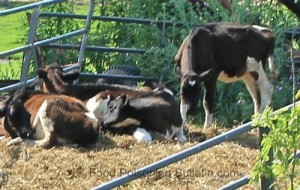Talk about deep cleaning. USDA researchers have discovered that E.coli levels in the digestive tracts of cows is dramatically reduced if orange oil, a popular ingredient in household cleaning products, is added to their diet.
 Orange oil in the peel and pulp of oranges contains natural antimicrobials that kill pathogenic bacteria including Salmonella and E.coli. Cows, who seem to enjoy these zesty additions to their diet, can eat them without disruption of their digestive systems and, as abundant byproducts of the juice industry, orange peels are an economical, natural and humane food safety solution, researchers say.
Orange oil in the peel and pulp of oranges contains natural antimicrobials that kill pathogenic bacteria including Salmonella and E.coli. Cows, who seem to enjoy these zesty additions to their diet, can eat them without disruption of their digestive systems and, as abundant byproducts of the juice industry, orange peels are an economical, natural and humane food safety solution, researchers say.
A team of researchers has been studying the citrus byproducts as a possible food safety measure since 1999. The team includes: Todd R. Callaway, Agricultural Research Service (ARS) microbiologist; Tom S. Edrington, an animal scientist with the Food and Feed Safety Research Unit in College Station, Texas; Jeffery Carroll, ARS animal scientist and research leader with the Livestock Issues Research Unit in Lubbock, Texas; and John Arthington of the University of Florida in Ona.
“While foodborne pathogens are found in the gut of food animals, non-antibiotic methods to reduce such pathogens in the live animal are important to improving food safety,” Callaway said in a recent report. Non-therapeutic doses of antibiotics in farm animals have been linked to the development of drug-resistant bacteria.
Adult cows can have more than 1 trillion microbes in each ounce of their rumen fluid. Many of these are harmless or beneficial microbes that play a vital role in the cow’s complex digestive process. But some are pathogens and reducing those populations within the gastrointestinal tracts of cattle could improve food safety because fewer pathogenic bacteria would be present during slaughter and processing, according to the report
The addition of a small amount of orange peel and pulp to a mixture of ruminal fluid in a laboratory setting reduced populations of E. coli O157:H7 and S. Typhimurium, Callaway’s research group demonstrated. The amount required to achieve the reduction is similar to a what a cow would realistically ingest on a farm, the researchers said in a report of their 2008 study, published in Foodborne Pathogens and Disease.
As is the case with most bulky, inexpensive items, the shipping and handling fees of orange peels are steep. “Even as compost, citrus peels are difficult to transport,” Callaway says. So the group’s latest studies are looking at processed orange peel pellets.
Sheep were the first animals to sample the pellets. After eating them for 10 days, the sheep had a 10-fold reduction in Salmonella and E. coli O157:H7 in their intestines, Callaway said. The team has received a grant from the National Cattlemen’s Beef Association (Beef Checkoff funds) to help fund the work.




